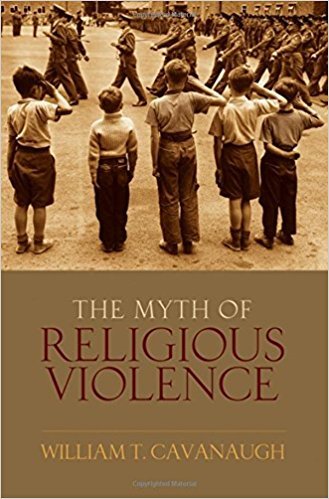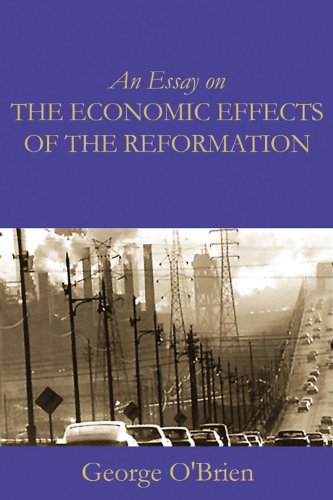Salaam
Theres much talk about 'reformation' and how Islam 'needs' a reformation. Heres two books that will give you an unusual perspectives about what the reformation was about and its impact on world history.
Be careful what you wish for.
A History of the Protestant Reformation in England and Ireland
Blurb
Written between 1824 and 1827 by an English Protestant, A History of the Protestant Reformation in England and Ireland has been reprinted many times by Catholic publishers because it gives the true and usually untold story of the Protestant Revolt in England during the 16th century, revealing its disastrous consequence in the lives of people.
William Cobbett, the author of this book, is unabashedly pro-Catholic in this writing, showing that England was far better off before the Protestant 'Reformation' of Henry VIII and Elizabeth I than she was afterwards. For example, during Catholic times there was greater prosperity, no penury, no poor laws, almost no crime, no income tax, and a greater national military strength. Whereas, with the 'Reformation' came the destruction of the monasteries, the driving of countless thousands of tenant farmers from the lands they had formerly rented (virtually in perpetuity and at cheap rents) from Catholic monasteries, the creation of a vast number of homeless poor, the subsequent poor laws, income tax, a diminished military capacity, and despotism on the part of the monarchs - all this, followed by the Puritan Revolt, the dictatorship of Oliver Cromwell, the 'Glorious Revolution' in 1688 (that brought William and Mary to power and overthrew the legitimate king because he was a Catholic), an increase of taxation, the rise of national debt, and finally the American revolution.
The author shows how these dire results flowed directly from Englands casting flowed directly from Englands casting of the ancient Catholic Faith, brought to the Island by St Augustine of Canterbury in the 6th century and adhered to faithfully by the great majority of Englishmen for a thousand years. Cobbett shows how the revolutionaries were not only successful in eradicating the True Faith from their land, but he spells out the woeful consequences that befell the country as a result.
Picking up, as he does, the history of England with the reign of Henry VIII (1509-1547), he carries through the reigns of the Protestant Edward VI (1547-1553), the Catholic Mary Tudor (1553-15558), the Protestant Elizabeth I (1558-1603), the Protestant James I (1603-1625), the Protestant Charles I (1625-1649), the Puritan Oliver Cromwell (1653-1658), the tacit Catholic Charles II (1660-1685), the Catholic James II (1685-1688), and the Protestants William and Mary (1689-1702), all the way to George III (1760-1820)
In the process, the author not only relates many fascinating and important facts, he also gives an enlightening running commentary on the meaning and significance of the events of this period of history. For example, he describes and explains the cuel and tragic imprisonment and execution under Elizabeth I of the Catholic Mary Queen of Scots, Elizabeth cousin - who was the rightful heir to the English throne, rather than Elizabeth. He tells of the famous Gunpowder Plot (1604-05) and what provoked it, the St. Bartholomew's Day Massacre (1572) in France and what provoked that. And he finishes by giving a detailed financial comparison between the relative income of the people before and after the reformation in England.
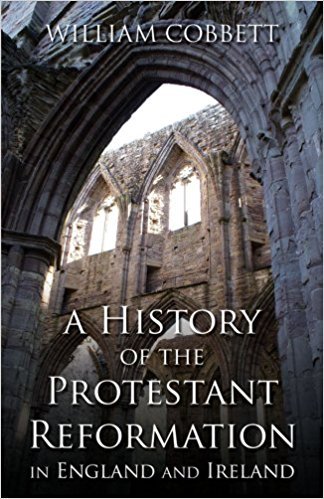
The Stripping of the Altars: Traditional Religion in England,1400-1580
Blurb
This profoundly influential book re-examines events leading up to the Reformation in England and illuminates our understanding of the period. A prize-winning account, it recreates lay people's experience of the religion of the pre-Reformation church showing that late-medieval Catholicism was neither decadent nor decayed, but was a strong and vigorous tradition, and that the Reformation represented a violent rupture from a popular and theologically respectable religious system. For this edition, Duffy has written a substantial new introduction, including a discussion of the Lollards and reflecting on recent developments in Reformation studies. 'A mighty and momentous book ...which reorders one's thinking about much of England's religious past.' Jack Scarisbrick, The Tablet 'Duffy wants to show the vitality and appeal of late medieval Catholicism and to prove that it exerted a diverse and vigorous hold over the imagination and loyalty of the people up to the very moment of the Reformation. He succeeds triumphantly.'Susan Bridgen, London Review of Books 'A magnificent scholarly achievement, a compelling read, and not a page too long.' Patricia Morrison, Financial Times 'A landmark book in the history of the Reformation.' Ann Eljenholm Nichols, Sixteenth Century Journal 'This book will afford enjoyment and enlightenment to layman and specialist alike. Duffy sweeps the reader along ...by his lively and absorbing detail, his piercing insights, patient analysis, and his vigour in debates.' Peter Heath, Times Literary Supplement 'Sensitively written and beautifully produced, this book represents a major contribution to the Reformation debate.' Norman Tanner, The Times 'Deeply imaginative, movingly written, and splendidly illustrated.' Maurice Keen, The New York Review of Books
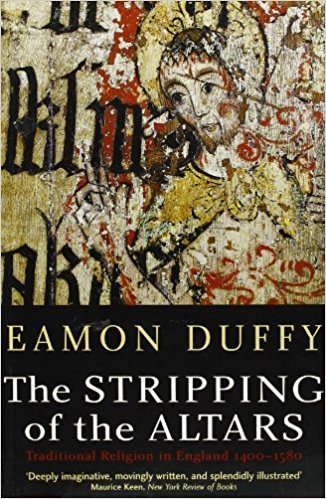
The Unintended Reformation: How a Religious Revolution Secularized Society
Blurb
In a work that is as much about the present as the past, Brad Gregory identifies the unintended consequences of the Protestant Reformation and traces the way it shaped the modern condition over the course of the following five centuries.
A hyperpluralism of religious and secular beliefs, an absence of any substantive common good, the triumph of capitalism and its driver, consumerism--all these, Gregory argues, were long-term effects of a movement that marked the end of more than a millennium during which Christianity provided a framework for shared intellectual, social, and moral life in the West. Before the Protestant Reformation, Western Christianity was an institutionalized worldview laden with expectations of security for earthly societies and hopes of eternal salvation for individuals.
The Reformation's protagonists sought to advance the realization of this vision, not disrupt it. But a complex web of rejections, retention's, and transformations of medieval Christianity gradually replaced the religious fabric that bound societies together in the West. Today, what we are left with are fragments: intellectual disagreements that splinter into ever finer fractals of specialized discourse; a notion that modern science--as the source of all truth--necessarily undermines religious belief; a pervasive resort to a therapeutic vision of religion; a set of smuggled moral values with which we try to fertilize a sterile liberalism; and the institutionalized assumption that only secular universities can pursue knowledge.
The Unintended Reformation asks what propelled the West into this trajectory of pluralism and polarization, and finds answers deep in our medieval Christian past.
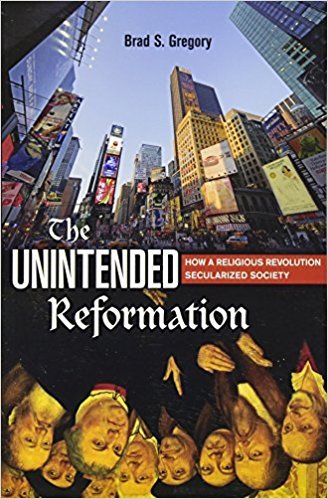
Theres much talk about 'reformation' and how Islam 'needs' a reformation. Heres two books that will give you an unusual perspectives about what the reformation was about and its impact on world history.
Be careful what you wish for.
A History of the Protestant Reformation in England and Ireland
Blurb
Written between 1824 and 1827 by an English Protestant, A History of the Protestant Reformation in England and Ireland has been reprinted many times by Catholic publishers because it gives the true and usually untold story of the Protestant Revolt in England during the 16th century, revealing its disastrous consequence in the lives of people.
William Cobbett, the author of this book, is unabashedly pro-Catholic in this writing, showing that England was far better off before the Protestant 'Reformation' of Henry VIII and Elizabeth I than she was afterwards. For example, during Catholic times there was greater prosperity, no penury, no poor laws, almost no crime, no income tax, and a greater national military strength. Whereas, with the 'Reformation' came the destruction of the monasteries, the driving of countless thousands of tenant farmers from the lands they had formerly rented (virtually in perpetuity and at cheap rents) from Catholic monasteries, the creation of a vast number of homeless poor, the subsequent poor laws, income tax, a diminished military capacity, and despotism on the part of the monarchs - all this, followed by the Puritan Revolt, the dictatorship of Oliver Cromwell, the 'Glorious Revolution' in 1688 (that brought William and Mary to power and overthrew the legitimate king because he was a Catholic), an increase of taxation, the rise of national debt, and finally the American revolution.
The author shows how these dire results flowed directly from Englands casting flowed directly from Englands casting of the ancient Catholic Faith, brought to the Island by St Augustine of Canterbury in the 6th century and adhered to faithfully by the great majority of Englishmen for a thousand years. Cobbett shows how the revolutionaries were not only successful in eradicating the True Faith from their land, but he spells out the woeful consequences that befell the country as a result.
Picking up, as he does, the history of England with the reign of Henry VIII (1509-1547), he carries through the reigns of the Protestant Edward VI (1547-1553), the Catholic Mary Tudor (1553-15558), the Protestant Elizabeth I (1558-1603), the Protestant James I (1603-1625), the Protestant Charles I (1625-1649), the Puritan Oliver Cromwell (1653-1658), the tacit Catholic Charles II (1660-1685), the Catholic James II (1685-1688), and the Protestants William and Mary (1689-1702), all the way to George III (1760-1820)
In the process, the author not only relates many fascinating and important facts, he also gives an enlightening running commentary on the meaning and significance of the events of this period of history. For example, he describes and explains the cuel and tragic imprisonment and execution under Elizabeth I of the Catholic Mary Queen of Scots, Elizabeth cousin - who was the rightful heir to the English throne, rather than Elizabeth. He tells of the famous Gunpowder Plot (1604-05) and what provoked it, the St. Bartholomew's Day Massacre (1572) in France and what provoked that. And he finishes by giving a detailed financial comparison between the relative income of the people before and after the reformation in England.

The Stripping of the Altars: Traditional Religion in England,1400-1580
Blurb
This profoundly influential book re-examines events leading up to the Reformation in England and illuminates our understanding of the period. A prize-winning account, it recreates lay people's experience of the religion of the pre-Reformation church showing that late-medieval Catholicism was neither decadent nor decayed, but was a strong and vigorous tradition, and that the Reformation represented a violent rupture from a popular and theologically respectable religious system. For this edition, Duffy has written a substantial new introduction, including a discussion of the Lollards and reflecting on recent developments in Reformation studies. 'A mighty and momentous book ...which reorders one's thinking about much of England's religious past.' Jack Scarisbrick, The Tablet 'Duffy wants to show the vitality and appeal of late medieval Catholicism and to prove that it exerted a diverse and vigorous hold over the imagination and loyalty of the people up to the very moment of the Reformation. He succeeds triumphantly.'Susan Bridgen, London Review of Books 'A magnificent scholarly achievement, a compelling read, and not a page too long.' Patricia Morrison, Financial Times 'A landmark book in the history of the Reformation.' Ann Eljenholm Nichols, Sixteenth Century Journal 'This book will afford enjoyment and enlightenment to layman and specialist alike. Duffy sweeps the reader along ...by his lively and absorbing detail, his piercing insights, patient analysis, and his vigour in debates.' Peter Heath, Times Literary Supplement 'Sensitively written and beautifully produced, this book represents a major contribution to the Reformation debate.' Norman Tanner, The Times 'Deeply imaginative, movingly written, and splendidly illustrated.' Maurice Keen, The New York Review of Books

The Unintended Reformation: How a Religious Revolution Secularized Society
Blurb
In a work that is as much about the present as the past, Brad Gregory identifies the unintended consequences of the Protestant Reformation and traces the way it shaped the modern condition over the course of the following five centuries.
A hyperpluralism of religious and secular beliefs, an absence of any substantive common good, the triumph of capitalism and its driver, consumerism--all these, Gregory argues, were long-term effects of a movement that marked the end of more than a millennium during which Christianity provided a framework for shared intellectual, social, and moral life in the West. Before the Protestant Reformation, Western Christianity was an institutionalized worldview laden with expectations of security for earthly societies and hopes of eternal salvation for individuals.
The Reformation's protagonists sought to advance the realization of this vision, not disrupt it. But a complex web of rejections, retention's, and transformations of medieval Christianity gradually replaced the religious fabric that bound societies together in the West. Today, what we are left with are fragments: intellectual disagreements that splinter into ever finer fractals of specialized discourse; a notion that modern science--as the source of all truth--necessarily undermines religious belief; a pervasive resort to a therapeutic vision of religion; a set of smuggled moral values with which we try to fertilize a sterile liberalism; and the institutionalized assumption that only secular universities can pursue knowledge.
The Unintended Reformation asks what propelled the West into this trajectory of pluralism and polarization, and finds answers deep in our medieval Christian past.

Last edited:

